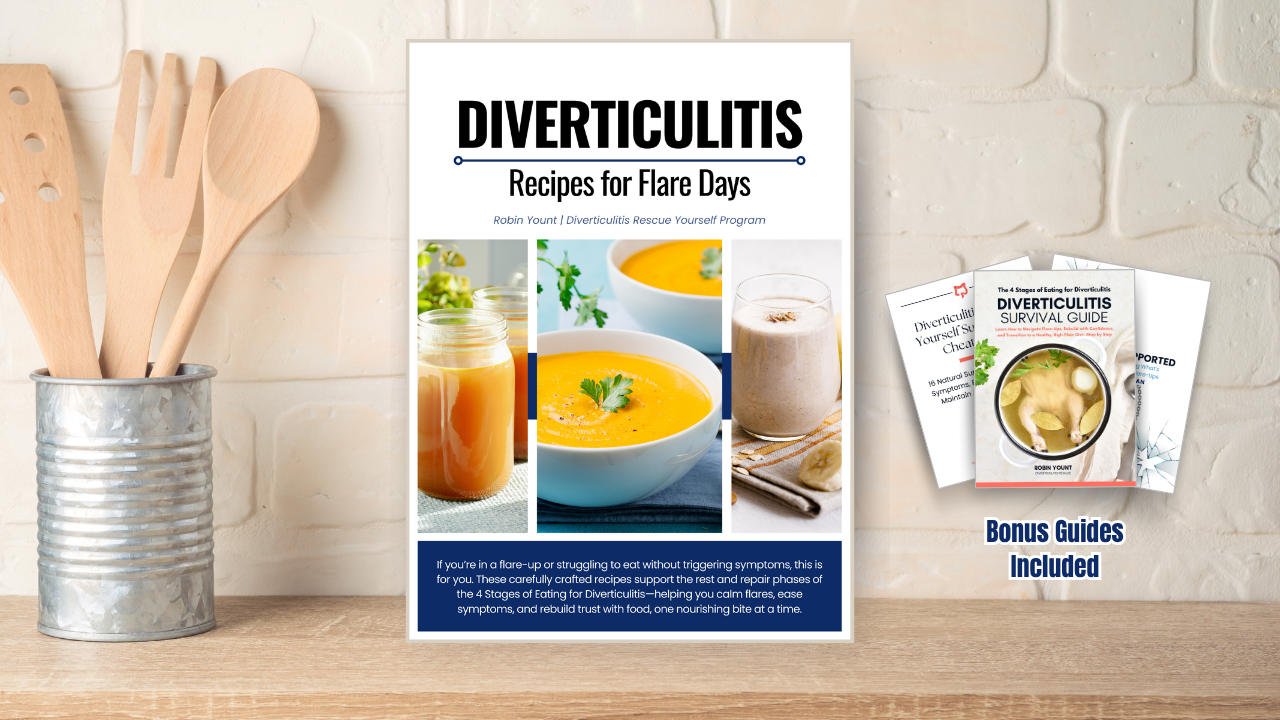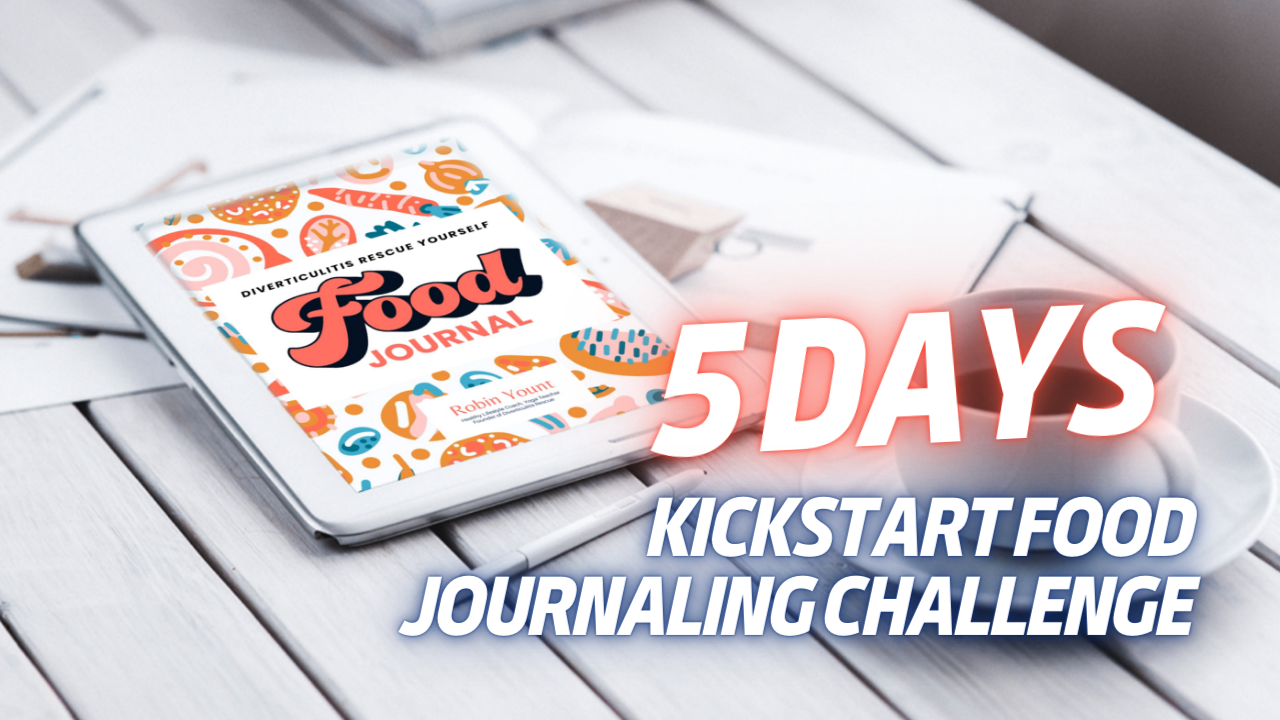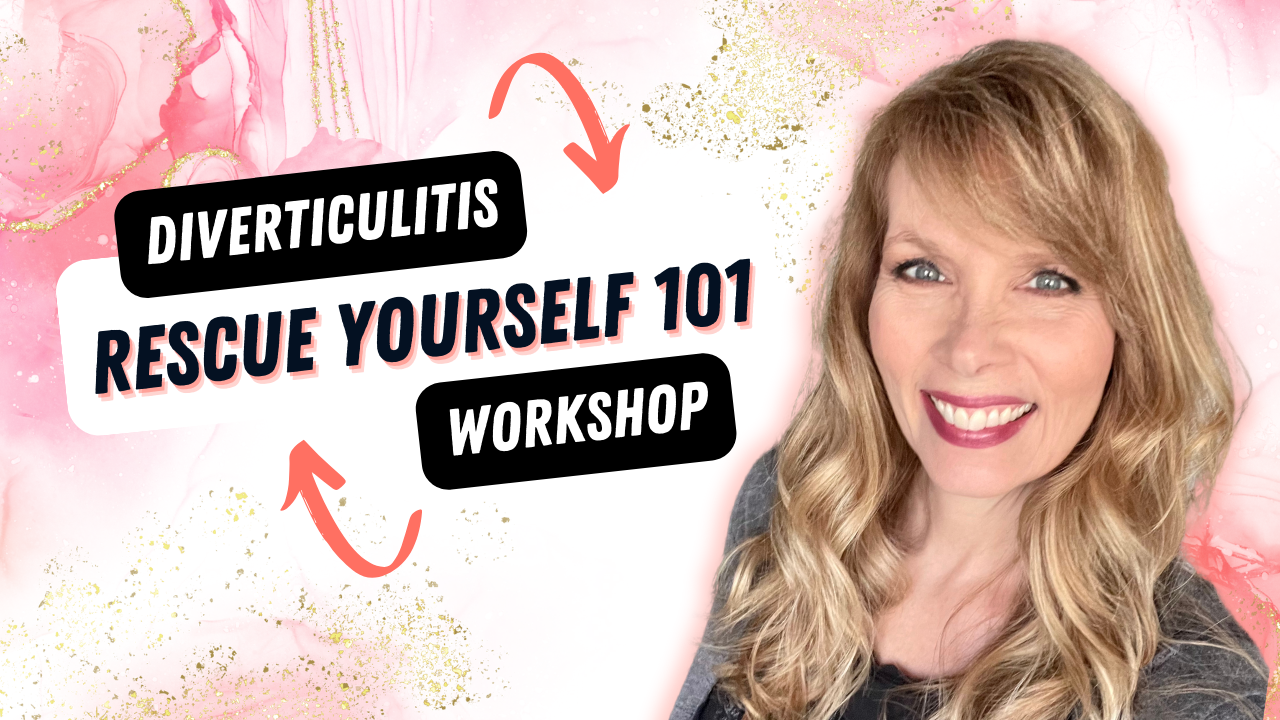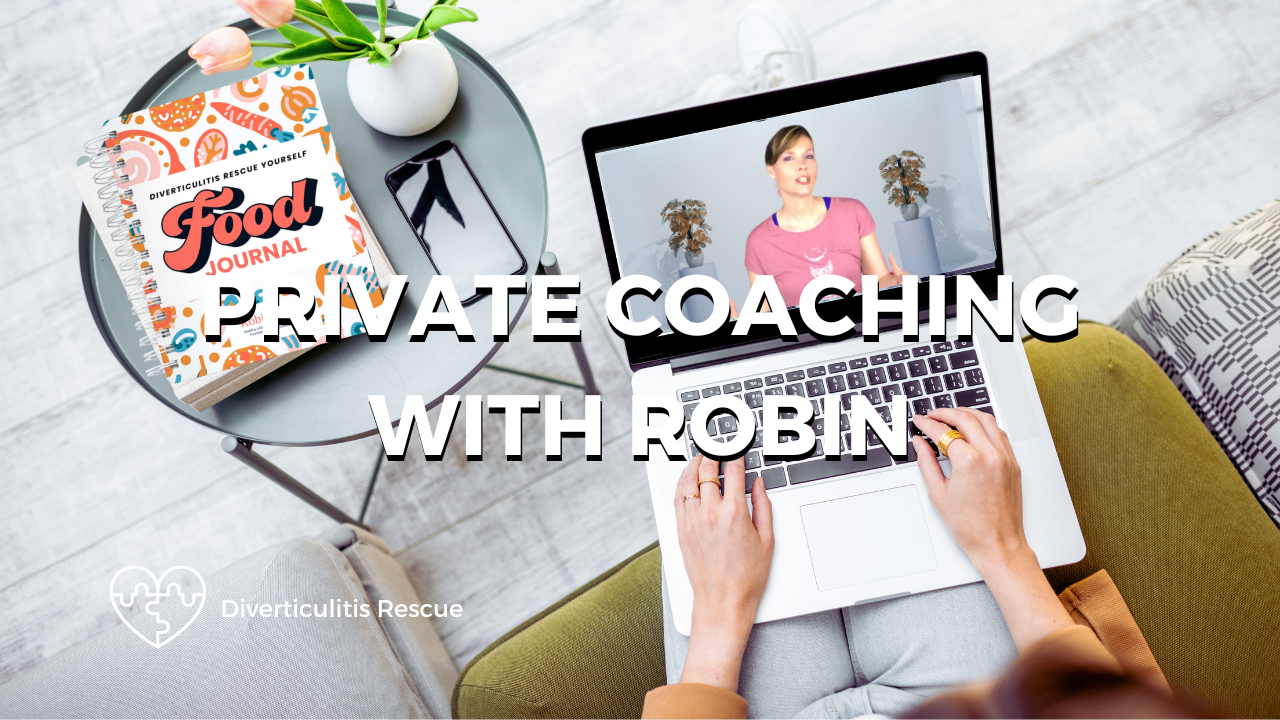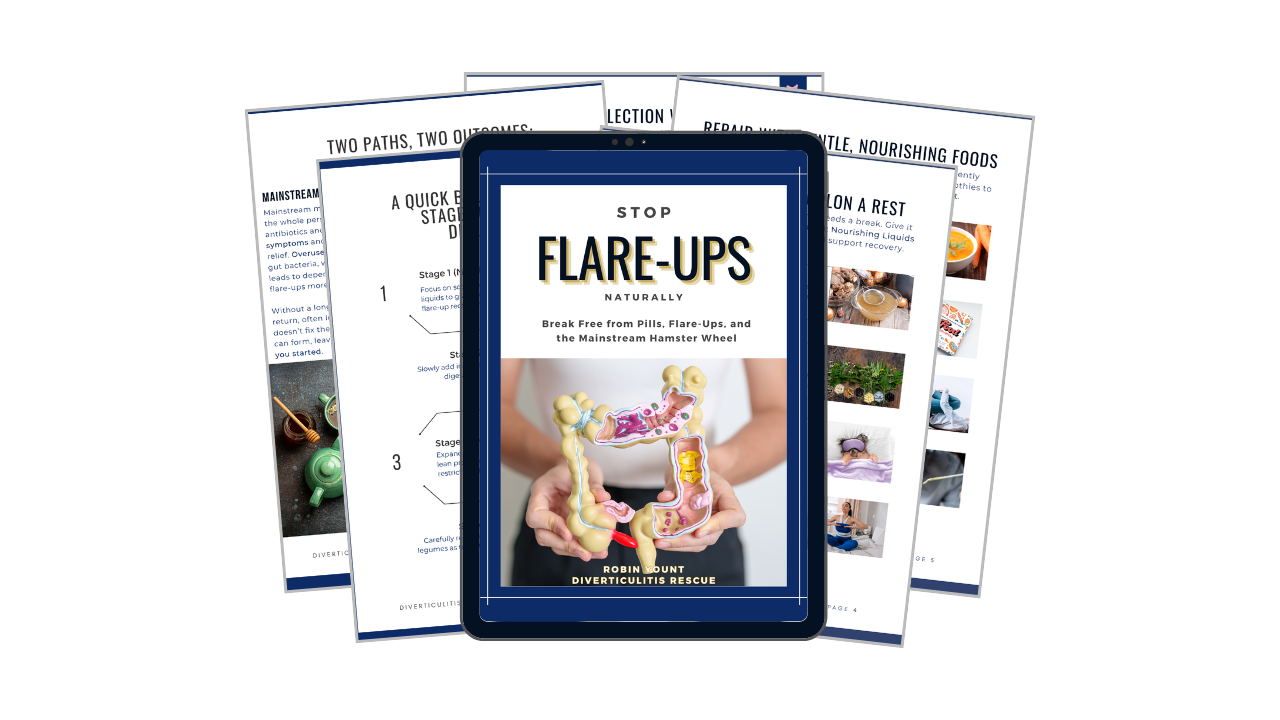Pumpkin Palooza: Embrace the Flavors and Nourish Your Gut
Oct 22, 2023
It’s that time of year when pumpkins take center stage, gracing our doorsteps and filling our kitchens with their warm, comforting aroma. But did you know that pumpkin is more than just a seasonal delight for carving jack-o'-lanterns and baking pies? This bright orange squash holds a secret - it contains powerful nutrients and compounds that can help heal and soothe the digestive tract, making it an ideal food for managing diverticulitis naturally.
In today's blog post, we invite you to dive into the world of pumpkin and discover its incredible benefits. We'll explore the healing potential of this vibrant orange squash and guide you through the 4 stages of incorporating it into your diet to support your digestive health. Along the way, we'll share an exclusive anti-inflammatory pumpkin soup recipe that will leave you feeling nourished and satisfied. So, grab a cup of tea, get comfortable, and let's embark on a journey to explore the wonders of pumpkin and its role in your path to Diverticulitis Rescue.
Diverticulitis occurs when small pouches called diverticula in the colon become inflamed or infected. This often leads to intense abdominal pain, bloating, nausea and changes in bowel habits. Pumpkin contains key nutrients and plant compounds that help fight inflammation, balance gut bacteria and promote intestinal healing.
Pumpkin Power: Harnessing the Benefits for Diverticulitis Relief
When it comes to managing diverticulitis naturally, pumpkin is a true superstar. This vibrant orange squash is packed with a variety of nutrients and compounds that offer numerous benefits for your digestive health. Let's take a closer look at why pumpkin is a fantastic addition to your diverticulitis rescue plan.
First and foremost, pumpkin is rich in essential vitamins and minerals that possess strong anti-inflammatory properties. Vitamins A, C, and E, along with zinc, work together to reduce inflammation in the body. These nutrients help calm the digestive tract and alleviate symptoms associated with diverticulitis.
But that's not all - pumpkin also contains powerful antioxidants called carotenoids, such as beta-carotene and lutein. These antioxidants play a crucial role in reducing inflammation and protecting the body against oxidative stress. By incorporating pumpkin into your diet, you can boost your antioxidant intake and support your body's natural healing processes.
Another remarkable aspect of pumpkin is its prebiotic content. Prebiotics are a type of fiber that acts as food for the beneficial bacteria in your gut. By nourishing these friendly microbes, prebiotics help restore a healthy balance of gut bacteria. Pumpkin's prebiotic fiber, combined with its other healing properties, can contribute to a healthier gut environment and improved digestive function.
Furthermore, pumpkin contains a unique type of fiber called mucilaginous fiber. When this fiber comes into contact with water, it forms a gel-like consistency that coats and protects the intestinal lining. This protective gel allows the inflamed areas of the digestive tract to heal and reduces discomfort. Additionally, pumpkin's anti-inflammatory compound called cucurbitacin aids in the healing process, further supporting your journey to diverticulitis relief.
Lastly, the fiber and water content in pumpkin can help alleviate constipation, a common issue for individuals with diverticulitis. By adding bulk to stool and softening it, pumpkin promotes regular bowel movements and prevents straining. This gentle and natural approach to relieving constipation can help reduce the risk of worsening diverticula inflammation.
Incorporating pumpkin into your diet is a simple and delicious way to support your digestive health and manage diverticulitis naturally. Whether you enjoy it in soups, stews, or even baked goods, this versatile squash offers a range of benefits that can contribute to your overall well-being. So, let's dive into some creative and mouthwatering ways to incorporate pumpkin into your diverticulitis rescue plan.
The FODMAP Friendly Facts on Pumpkin
If you're experiencing frequent gas and bloating, incorporating a low FODMAP diet into the four stages of eating for diverticulitis for a few weeks can be incredibly helpful. Gas and bloating are common symptoms of irritable bowel syndrome that can cause discomfort and lead to flare-ups. That's where pumpkin comes in. Not only is pumpkin low in FODMAPs, which means it is less likely to cause digestive distress, but it also offers a range of benefits for your gut health. You can safely enjoy pumpkin and products made from its flesh and seeds, allowing you to savor the goodness of pumpkin without worrying about irritating your digestive system. Plus, the fiber content in pumpkin can work wonders in regulating bowel movements and promoting a healthy digestive system, effectively reducing the occurrence of gas and bloating.
For those with IBS, diverticulitis, or other gut conditions, pumpkin is a true gut-friendly food that can help alleviate symptoms without contributing high amounts of fermentable carbs. So go ahead and enjoy pumpkin liberally! Just remember to be mindful when cooking with pumpkin and avoid adding high FODMAP ingredients like garlic, onions, or lactose. By doing so, you can fully embrace the benefits of pumpkin and create delicious, gut-friendly meals that will leave you feeling satisfied and comfortable.
Practical Tips for Adding Pumpkin
When adding pumpkin to your diet, be mindful of what stage of eating for diverticulitis you are in. Those in early stages should stick to pureed or very well-cooked pumpkin dishes that are easier to digest. As you progress to the later stages, you can incorporate less processed pumpkin recipes. Pumpkin can be incorporated through all 4 Stages. Let's examine how.
Stage 1: Pumpkin Juice
While you are in Stage 1, the goal is to provide your body caloric energy and key nutrients it needs to heal, while being gentle on your sensitive digestive system. Pumpkin juice can be a great option to fulfill that role. While canned options are convenient, it's important to read the label carefully. For better control over quality, consider making homemade pumpkin juice using an actual pumpkin. Aim for organic pumpkin whenever possible to ensure the best quality.
Here's a quick pumpkin juicing recipe to try: In a juicer, add cubed pumpkin, green apple, and ginger. Finish with cinnamon, clove, and a pinch of sea salt to taste.
Stage 2: Pumpkin Soup Puree
Transitioning to Stage 2 means moving from liquids to easy-to-digest soft foods. A pumpkin soup puree is a great option as it is naturally low in fiber yet provides key nutrients. The pureeing breaks down the pumpkin's structure, making it simpler for your digestive system to process. This aids the gut by allowing it to continue healing without having to work too hard.
See recipe below!
Stage 3: Roasted Pumpkin Cubes
As you progress to Stage 3, it's time to start incorporating cooked, roasted, and sautéed foods into your diet. A fantastic gut-healthy option for this stage is cubed, roasted pumpkin. Roasting the pumpkin helps break it down and brings out its natural sweetness. However, it's important to note that the cubes may be slightly harder to digest compared to a pureed soup. That's why it's crucial to follow the stages sequentially, allowing your gut time to heal and prepare for foods like roasted pumpkin cubes. Enjoy the delicious and nourishing benefits of roasted pumpkin as you continue on your healing journey.
Stage 4: Roasted Pumpkin Seeds
As you progress to Stage 4, you can begin reintroducing nuts and seeds into your diet, including roasted pumpkin seeds. Contrary to old myths, research shows that seeds and nuts do not cause diverticulitis flares. In fact, pumpkin seeds are a great addition to your diet as they provide protective plant-based compounds and fiber. They contain lignin and insoluble fiber, which can benefit your gut health.
When incorporating pumpkin seeds, it's important to start slowly and chew them well, as they may be slightly harder to digest at first. Your gut has gradually strengthened over the stages, but it's essential to pay attention to any discomfort and adjust accordingly. Listen to your body and test your tolerance, slowly building on your menu. Remember to continue flowing between all four stages to maintain your personal balance.
Instructions:
- In a large pot, heat the olive oil over medium heat. Add the onion and sauté for 5 minutes until translucent.
- Add the garlic and sauté for 1 minute until fragrant.
- Add the pumpkin puree, broth, cinnamon and nutmeg. Whisk to combine.
- Bring the soup to a boil then reduce heat and simmer for 15 minutes.
- Use an immersion blender to puree the soup until smooth and creamy.
- Season with salt and pepper to taste.
Conclusion
Embrace the goodness of pumpkin and nourish your body with this delicious squash. Don't let diverticulitis hold you back from enjoying the flavors of the fall season. Pumpkin is an ideal food that can be enjoyed in all phases of the 4 Stages. It's low FODMAP and provides nutrients that aid healing. The pumpkin also provides antioxidants and spices that help reduce inflammation, making it the perfect addition to your diverticulitis rescue plan.
Whether you're sipping on a warm bowl of anti-inflammatory pumpkin soup during Stage 2 or indulging in pumpkin seeds in Stage 4, there's something for everyone to enjoy. Let your taste buds dance with delight as you explore the creative and mouthwatering ways to incorporate pumpkin into your meals.
To learn more about the 4 Stages of Eating for Diverticulitis and how to manage symptoms and flare-ups naturally, click here.

Stay Connected with My Newsletter
YOUR SOURCE FOR DIVERTICULITIS SUPPORT & INSPIRATION
Dive into our newsletter. Each edition delivers personal stories, natural strategies, and practical tips to help you find balance, relief, and strength on your journey.
Sign up with your email to stay connected and gain exclusive diverticulitis insights to support your gut health and a flare-free life.
We hate SPAM. We will never sell your information, for any reason.





